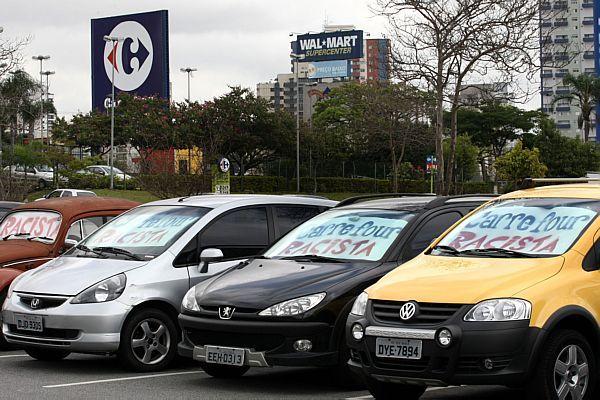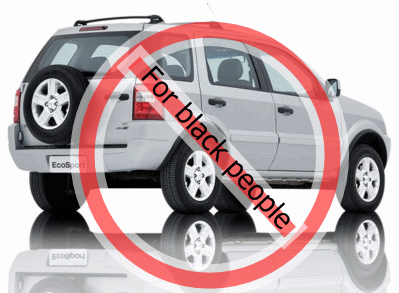Towards the end of August the simmering debate about racism and prejudice in Brazilian society was stirred up by a case that has provoked outrage throughout the country. Januário Alves de Santana, a black man in his late thirties, was beaten by a couple of security guards as he waited for his wife and children in the car park of one of the largest international retailers in Brazil. He was accused of trying to steal his own car [pt]. The attackers clearly thought that because he was black he wouldn’t be able to afford a Ford EcoSport (a model of car considered upmarket in Brazil).
Rachel Glickhouse, from Adventures of a Gringa, describes the course of events of August 7th in detail, as told by Januário. She blogs in English:
Standing outside of the car, he noticed more suspicious men approaching him. Then one–who was actually a security guard–approached him and took out a gun. He attacked Januário without identifying himself, and Januário didn’t know if it was a mugger or a cop. While they struggled, passersby called for help, and Januário thought he was saved. Several security guards from Carrefour approached, and he explained that it was a misunderstanding–he was not in fact trying to steal the motorcycle nearby. The security guards grabbed him and took him inside to a small room to “work out” what had happened. “So,” they said, “you stole an EcoSport and were trying to take a motorcycle, too?”
The five security guards then proceeded to beat Januário senseless, in what the original report called “a torture session,” hitting, punching, headbutting, and pistol-whipping him, knocking out his teeth and leaving him bleeding heavily. Januário says he tried to explain that the car was his, and that his baby daughter was inside while his family was shopping. His attackers ignored him. “Shut up, n*****. If you don’t shut up, I’ll break every bone in your body,” one of them yelled. They laughed when he insisted it was his car. The beating lasted around twenty minutes, before the police arrived.
And she adds that “the torture wasn’t over yet”, even after the arrival of the police:
One of the military policemen, by the name of Pina, didn’t buy Januário’s “story.” “You look like you’ve been in jail a couple of times. Come on, fess up, it’s ok,” the police officer said. Another police officer didn’t believe he was a security guard, and started quizzing him about security rules. Finally, the police went to Januário’s car and confirmed it did in fact belong to him and his wife. His family was there, shocked to see him bleeding with cracked teeth, and his daughter was still asleep in the car.
The police left without offering to send an ambulance or helping him. Taken to hospital by his family, Januário was treated for shock and lacerations. He has since lost 8 kilos, has been suffering from insomnia and has not been able to return to work. Last Thursday, he underwent an operation to correct a bone fracture in his skull. The family has logged a complaint with the local police, but according to the police version, his beating was a result of “a disturbance” and “a fight between a few shoppers”. Carrefour has issued a statement expressing its regret at the misunderstanding and saying it will cooperate with the investigations [pt].
Meanwhile, Januário plans to take both the retail chain and the State of São Paulo to court, and to sell the car, which he is still paying off in R$789 [approximately $419] instalments, spread over a set of 72 instalments.
The case has had repercussions all over the country, with most people sympathizing with Januário, but this is not the first time that something like this has happened. As the Censurado [Censored, pt] blog points out [pt], many other acts of prejudice against black people have been committed by the security personnel of this same retail chain. The blogger ironically asks the readers:
Queria um conselho dos meus leitores. Se um dia eu precisar comprar, sei lá, um shampoo no Carrefour, devo levar um amigo branco junto comigo?
Maria Frô [pt] replicates the original news story by AfroPress [pt], adding a different headline that paraphrases the Brazilian bestseller “Não Somos Racistas” [We Are Not Racists] by journalist Ali Kamel. The title of her blog post is:
É, segundo Kamel, não somos racistas. Só quase assassinos.
The Pão e Rosas [pt] blog vehemently repudiated the case. It follows the same line of argument, disputing the myth that cultural melting pot Brazil is a harmonious racial democracy:
Enquanto os discursos de intelectuais, políticos burgueses e dos meios de comunicação afirmam veemente “Não somos racistas”, vem à tona um caso escandaloso de como o racismo se reproduz nas formas mais violentas e repugnantes. Todo a falácia da democracia racial cai por terra frente a casos como este – e poderíamos listar tantos outros que ganharam repercussão e depois foram esquecidos, na maioria das vezes marcados pela impunidade.
Juarez Silva Jr., from Blog do Juarez [pt], wonders if it is indeed true that discrimination against black people in Brazil is a social, not racial, problem:
quando o negro sai do seu “esteriótipo e ‘lugar’ social ” ele “paga o preço”, afinal se ele não tivesse um carro bacana, talvez nada disso tivesse acontecido não é mesmo ???? , cansado de ter problemas por sua situação social não condizer com o “esperado” pela sociedade, a vítima já pensa em vender o “carro problemático” […]
Deus me livre de por as rodas do meu vistoso Adventure no estacionamento dessa rede…, BOICOTE JÁ.
God forbid that I should allow the wheels of my smart Adventure on this retailer’s parking area… LET’S BOYCOTT IT NOW.

"Racist Carrefour", a demonstration against racism on car windows in Carrefour’s car park. Photo by @berlitz on Twitpic
On the Geledés Instituto da Mulher Negra [Geledés Black Woman Institute, pt] website, many people lamented this news and voiced their indignation in the comment box. For instance, Ayraon says:
Só no Brasil se acha que o racismo é velado. Velado nada! Só não vê quem não quer, ou seja, o povo brasileiro iludido por uma visão deturpada de si mesmo. “Somos mestiços!” diz um, “Não existe preto ou branco” diz outro na hora que esse preto inexistente diz sofrer racismo. Lá fora, quem conhece o Brasil, não consegue entender como esse país pode, por tanto tempo, esconder seu racismo doente. Aqui dentro, vivemos na insanidade coletiva: brancos acham que racismo não existe, que tá na cabeça dos pretos (que, segundo alguns pretos e brancos, não existem), negros dizem que o racismo brasileiro é “velado”; e muitos aceitam essa situação (alguns até dizendo nunca terem sofrido racismo, mesmo sendo alvo dele todo o dia). A história do bahiano me deixa triste , por que ela v ai se repetir, e se repetir, e se repetir sem que façamos nada. Ou iremos fazer algo?
To answer the blogger’s question, the protests have begun. There was a demonstration on August 22nd, and according to Geledés a bigger protest against the retail chain will take place on September 5th.
Race is a very complex issue for countries that once were colonies of developed states and overshadowed by slavery; a lot of prejudice remains in modern society. Brazil is marked by the violent slavery of black Africans, which lasted for over 300 years and was, to a certain degree, the linchpin of the economic framework during the colonial era. Racism has always been linked to social relations in this country. Black people here today have inherited this social stigma and suffer from racism in many aspects of their daily life. But this is all food for thought, and material for another post.


Leave Your Comments